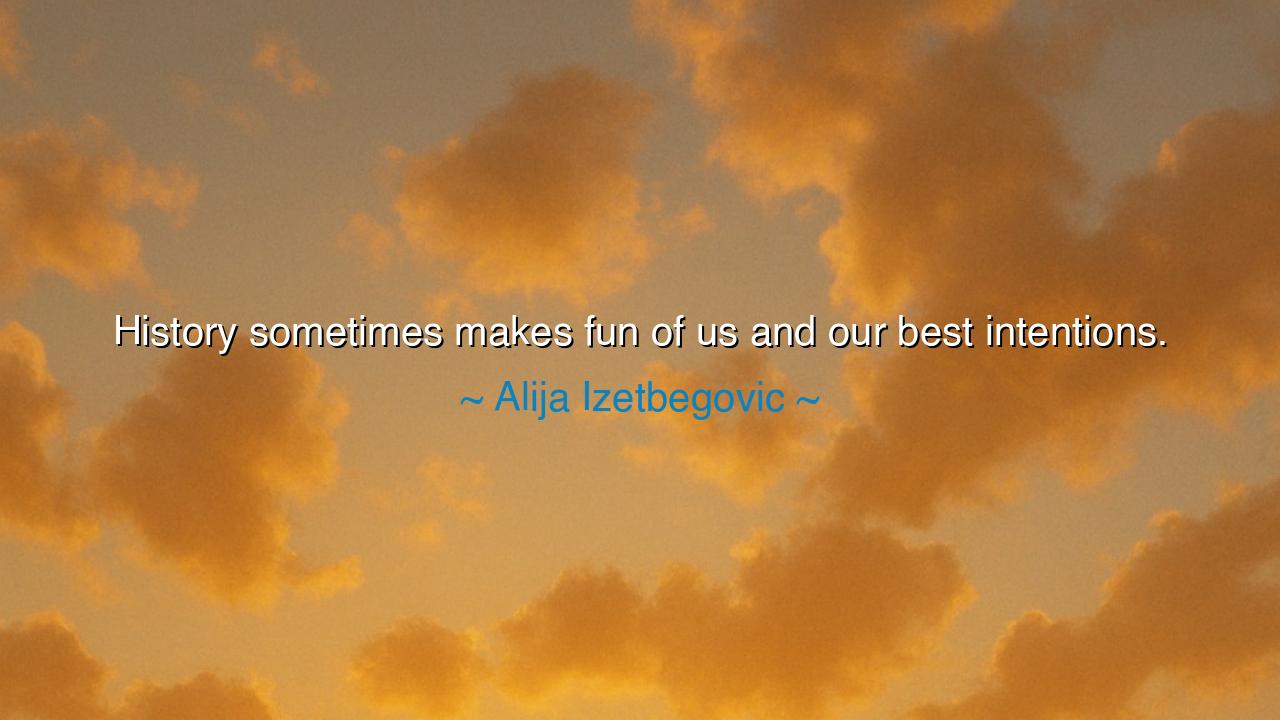
History sometimes makes fun of us and our best intentions.






The philosopher and statesman Alija Izetbegović, who guided Bosnia through one of the darkest passages of modern history, once said: “History sometimes makes fun of us and our best intentions.” These words, forged in the crucible of war and human tragedy, carry the sorrow and wisdom of a man who had seen the noble dreams of nations turned to dust. They are not words of despair, but of clarity. In them lies the recognition that human purpose, however pure, is never immune to the irony of fate. For history, that vast river of human endeavor, does not always reward virtue or reason—it often bends according to the unpredictable winds of circumstance and the folly of men.
Izetbegović spoke as one who had witnessed firsthand the collapse of ideals. He saw a multiethnic Yugoslavia disintegrate into bloodshed, its lofty visions of brotherhood torn apart by hatred. He watched as the very people who had once sworn to live together under the banner of unity fell into tribalism and war. His words are a lament for those moments when moral intention collides with historical reality—when leaders and nations set out to build peace, justice, or progress, only to see their labors twisted into tragedy. It is not that their intentions were false, but that history, like a mischievous trickster, reshapes the meaning of their actions in ways they could never foresee.
This truth is as old as civilization itself. Consider the tale of Prometheus, who brought fire to mankind out of compassion, only to be punished eternally for his gift. His act of generosity became, in the eyes of the gods, an act of rebellion. Or think of Napoleon, who began his rise proclaiming liberty, equality, and fraternity, yet ended as a conqueror whose wars ravaged Europe. Time often mocks the purity of beginnings. The road to greatness is littered with the ruins of intentions betrayed by pride, misunderstanding, or simply the tide of events. History laughs softly at human certainty, reminding us that no plan—however righteous—can account for the complexity of the world.
Yet Izetbegović’s words are not a call to surrender. They are a summons to humility—to act with conviction, but also with awareness of the limits of our power. He himself, though weary from years of struggle, never abandoned the pursuit of peace. He understood that to do good in an uncertain world is to plant seeds that may bloom long after one’s lifetime—or not at all. The wise, therefore, do not act for guaranteed reward, but because goodness itself is worth the effort, even when mocked by fate.
There is also a lesson here about the nature of leadership and responsibility. The leader, the thinker, the artist—all who strive to shape the world—must accept that their work will one day be judged by forces beyond their control. History, like a mirror warped by time, will reflect their deeds differently in each generation. What is called tyranny in one age may be seen as vision in another; what is hailed as progress may later be mourned as destruction. Thus, the wise do not chase the favor of history—they act according to conscience, not prediction.
Consider Mahatma Gandhi, whose movement of nonviolence led India toward freedom, yet whose nation was torn apart by partition immediately after. Or Abraham Lincoln, whose Emancipation Proclamation freed millions but cost hundreds of thousands of lives in civil war. These figures acted with the purest of intentions, yet history’s judgment remains tangled and complex. Their legacies remind us that righteousness is not defined by outcome, but by intent—and that even when history “makes fun” of our ideals, the ideals remain sacred.
The lesson, then, is clear: act boldly, but walk with humility before the vastness of time. Do not expect gratitude from history; it is a poor and fickle judge. Instead, measure your actions by the integrity of your purpose. When you strive to do good, do it not for glory, but for truth. When your efforts fail or are misunderstood, take solace in knowing that every act of sincere intent adds a thread to the great tapestry of humanity—threads that may shine only centuries later.
So, my child, remember Izetbegović’s wisdom: history may mock us, but it cannot erase our sincerity. Let your deeds be honest, your motives pure, and your heart steadfast. For though history’s laughter may echo through the ages, the soul that acts with goodness will never be its fool—it will be its conscience.






AAdministratorAdministrator
Welcome, honored guests. Please leave a comment, we will respond soon